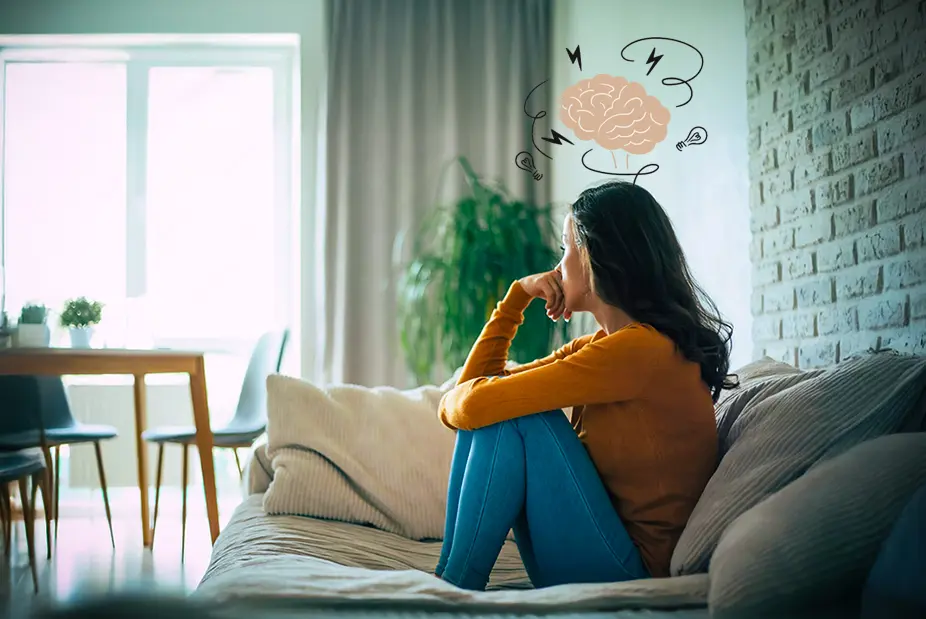Anxiety affects millions of people, yet many struggle to recognize its signs. It doesn’t always look like panic attacks or nervousness. Often, it hides behind physical tension, emotional fatigue, or unexplainable restlessness. If you have ever felt your heart race before a big meeting, experienced constant overthinking at night, or found it hard to breathe for no clear reason, anxiety could be playing a role.
The good news is: anxiety symptoms are manageable with a mindful approach.
In this blog, we will explore 10 common anxiety symptoms and show how you can address each one with mindfulness, self-awareness, and simple lifestyle shifts.
10 Symptoms Of Anxiety And Ways To Treat Them
Anxiety shows up in many forms—both physical and emotional. Detecting the symptoms is the first step.
Here are 10 common signs of anxiety and mindful ways to manage them.
1. Constant Worrying
Persistent worry is one of the most recognizable symptoms of anxiety. It creates a loop of “what ifs” that feel impossible to escape. Mindful treatment involves observing these thoughts without judgment.
Practice noting your worries, naming them, and gently bringing your attention back to the present moment. Daily mindfulness meditations can help break this cycle over time.
2. Racing Heart
Your heart may pound rapidly even when you are sitting still. Such a physical symptom is a common response to perceived stress. Instead of reacting to the sensation with fear, you can use mindful breathing to slow your heart rate.
Inhale deeply for four seconds, hold for four, exhale for six. Repeat this until your heartbeat steadies.
3. Shortness of Breath
Anxiety can tighten your chest, making it feel like you can’t breathe fully. When this happens, grounding exercises help. Focus on feeling your feet on the floor or the sensation of air entering your nostrils.
Let your breath flow naturally, without forcing it. Simply observing your breath brings you back to a state of calm.
4. Restlessness
Do you struggle to sit still or feel a constant urge to stay busy? Restlessness is your body’s way of saying it’s overwhelmed.
You may try mindful movement, such as yoga, walking meditation, or even slow stretching. These activities help discharge nervous energy while reconnecting you with your body.
5. Muscle Tension
Anxiety often shows up as clenched jaws, tight shoulders, or a stiff neck. Body scans can ease this. Set aside 5 minutes each day to scan your body from head to toe.
When you find tension, pause and breathe into that area. Visualise the tightness melting away with each exhale.
6. Sleep Issues
Difficulty falling or staying asleep is a major red flag. Racing thoughts or fear of tomorrow can keep your mind active at night. A mindful wind-down routine can help.
Avoid screens an hour before bed, dim the lights, and practise a calming ritual like journaling or a guided sleep meditation.
7. Irritability
Anxiety can make even minor inconveniences feel overwhelming. You might snap easily or feel on edge without understanding why. Recognizing irritability as a symptom, not a flaw, can be freeing. Use mindfulness to pause before reacting.
Ask yourself, “What do I really need right now?” Often, the answer is rest or space.
8. Difficulty Concentrating
When your mind constantly jumps between worries, it’s hard to focus. Try the “5-4-3-2-1” technique: name five things you see, four you can touch, three you hear, two you smell, and one you taste.
It pulls your mind away from distractions and anchors you in the present.
9. Fatigue
Anxiety drains your energy: emotionally, mentally, and physically. If you feel exhausted even after resting, give yourself permission to slow down. Integrate mindfulness throughout your day, not just during meditation. Eat slowly, walk mindfully, and listen deeply when others speak.
10. Digestive Issues
Butterflies in your stomach, nausea, or digestive discomfort often stem from anxiety. Your gut and brain are deeply connected. Mindful eating, probiotic-rich foods, and slowing down during meals can help ease symptoms.
Notice how your body responds to stress, and respond with gentleness, not discernment.
Find Support and Healing with ATL Behavioral
At ATL Behavioral, we understand how anxiety can quietly impact your daily life — from the way you sleep to how you connect with others. These symptoms are not signs of weakness; they are your mind and body asking for support. Through mindful, evidence-based approaches, we help individuals identify their anxiety patterns and learn practical tools to navigate them with greater calm and confidence.
You don’t have to manage anxiety alone. Take the first step toward healing!
Get in touch with ATL Behavioral today to schedule a consultation and begin your journey to balance and peace.




